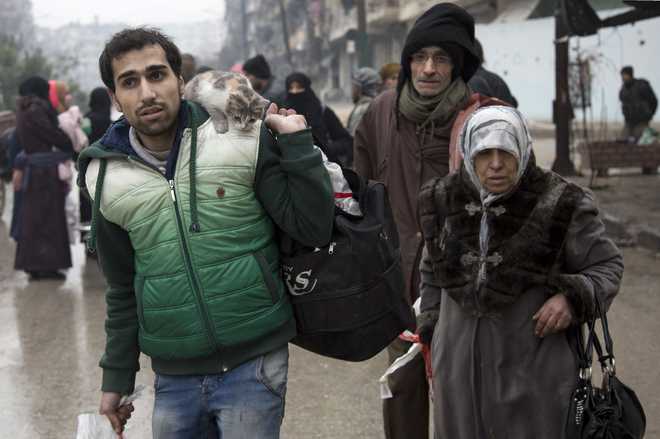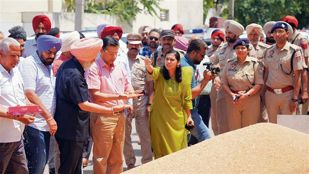
Syrians leave a rebel-held area of Aleppo towards the government-held side on December 13, 2016 during an operation by Syrian government forces to retake the embattled city. AFP photo
ALEPPO /BEIRUT, December 14
The evacuation of rebel-held eastern Aleppo due to start at dawn was delayed, perhaps until Thursday, with an opposition official blaming Iran and its Shi'ite militias allied to President Bashar al-Assad for the hold-up.
Syrian government forces resumed attacks on rebel-held eastern districts of Aleppo for about half an hour on Wednesday, rebel officials and witnesses said.
Artillery, tank-fire, and mortars shells hit the districts during the morning, a Turkey-based official in the Jabha Shamiya faction said, citing reports from the ground. "There is fierce bombardment by the regime forces," he told said.
There was no immediate comment from the army or the government.
Both sides agreed the ceasefire after advances by the army and its allies took most rebel territory. Buses waited to evacuate the rebels early on Wednesday, as agreed under the deal, but the operation was delayed.
Another rebel official based in Turkey called the shelling a breach of the ceasefire and said insurgents had returned fire.
A civilian witness said the attack lasted about half an hour then stopped. A Reuters reporter in a government-held part of Aleppo also heard blasts.
Syrian Observatory for Human Rights director Rami Abdulrahman said one explosion that was heard was "believed to have been caused by a artillery shell fired by regime forces".
Khaled Khatib, a spokesman for the civil defence rescue service in rebel-held Aleppo, said a number of civilians were injured by the shelling which hit the neighbourhoods of al-Sukari, al-Ansari and al-Ithaa on Wednesday morning. "This constitutes the first breach of the truce," he said.
Syrian forces resumed shelling rebel areas briefly on Thursday morning in what Russia said was a response to rebel attacks. Russian Foreign Minister Sergei Lavrov said rebel resistance was likely to end in the next two or three days.
Officials in the military alliance fighting in support of Assad could not be reached immediately for comment on why the evacuation was delayed.
Turkey blamed Syrian government forces and other groups for trying to obstruct the evacuation deal and said there would be more talks with Russia and Iran. Rebel sources blamed Iran for the hold-up.
"What is stopping the agreement presently is Iranian obstinacy," a commander with the rebel Nour al-Din al-Zinki group said from eastern Aleppo.
Sources on Tuesday had given different expected start times for the evacuation. A military official in the pro-Assad alliance had said the evacuation was due to start at 5 am (0300 GMT), while opposition officials had been expecting a first group of wounded people to leave earlier.
However, none had left by dawn, according to a witness waiting at the agreed point of departure. Twenty buses were waiting there with their engines running but showed no sign of moving into rebel districts.
Officials with Aleppo's rebel groups accused Shi'ite militias backed by Iran of obstructing the deal. The pro-opposition Orient TV said it may be delayed until Thursday.
People in eastern Aleppo have been packing their bags and burning personal possessions as they prepare to leave, fearing looting by the Syrian army and its Iranian-backed militia allies.
In what appeared to be a separate development from the planned evacuation, the Russian defence ministry said 6,000 civilians and 366 fighters had left rebel-held districts over the past 24 hours.
Rapid advances
The evacuation plan was the culmination of two weeks of rapid advances by the Syrian army and its allies that drove insurgents back into an ever-smaller pocket of the city under intense air strikes and artillery fire.
By taking full control of Aleppo, Assad has proved the power of his military coalition, aided by Russia's air force and an array of Shi'ite militias from across the region.
Rebels groups have been supported by the United States, Turkey and Gulf monarchies, but the support they have enjoyed has fallen far short of the direct military backing given to Assad by Russia and Iran.
Russia's decision to deploy its air force to Syria 18 months ago turned the war in Assad's favour after rebel advances across western Syria. In addition to Aleppo, he has won back insurgent strongholds near Damascus this year.
The government and its allies have focused the bulk of their firepower on fighting rebels in western Syria rather than Islamic State, which this week managed to take back the ancient city of Palmyra, once again illustrating the challenge Assad faces reestablishing control over all Syria.
Russia regards the fall of Aleppo as a major victory against terrorists, as it and Assad characterise all the rebel groups, both Islamist and nationalist, fighting to oust him.
But at the United Nations, the United States said the violence in the city, besieged and bombarded for months, represented "modern evil".
The once-flourishing economic centre with its renowned ancient sites has been pulverised during the war, which has killed hundreds of thousands of people, created the world’s worst refugee crisis and allowed the rise of Islamic State.
As the battle for Aleppo unfolded, global concern has risen over the plight of the 250,000 civilians who were thought to remain in its rebel-held eastern sector before the sudden army advance began at the end of November.
Tens of thousands of them fled to parts of the city held by the government or by a Kurdish militia, and tens of thousands more retreated further into the rebel enclave as it rapidly shrank under the army's lightning advance.
The rout of rebels in Aleppo sparked a mass flight of terrified civilians and insurgents in bitter weather, a crisis the United Nations said was a “complete meltdown of humanity”.
There were food and water shortages in rebel areas, with all hospitals closed.
'Everything's over'
The Syrian Observatory for Human Rights said heavy clashes including shelling and gunfire raged in the Syrian city of Aleppo on Wednesday after a truce deal stalled .
"The clashes are violent and bombardment is very heavy ... it seems as though everything (the ceasefire) is finished," Rami Abdulrahman, director of the British-based monitoring group, said.
‘Shot in their homes’
On Tuesday, the United Nations voiced deep concern about reports it had received of Syrian soldiers and allied Iraqi fighters summarily shooting dead 82 people in recaptured east Aleppo districts. It accused them of “slaughter”.
“The reports we had are of people being shot in the street trying to flee and shot in their homes,” said Rupert Colville, a UN spokesman. "There could be many more." The Syrian army has denied carrying out killings or torture among those captured, and Russia said on Tuesday rebels had “kept over 100,000 people in east Aleppo as human shields”.
Fear stalked the city's streets. Some survivors trudged in the rain past dead bodies to the government-held west or the few districts still in rebel hands. Others stayed in their homes and awaited the Syrian army's arrival.
For all of them, fear of arrest, conscription or summary execution added to the daily terror of bombardment.
“People are saying the troops have lists of families of fighters and are asking them if they had sons with the terrorists. (They are) then either left or shot and left to die,” said Abu Malek al-Shamali in Seif al-Dawla, one of the last rebel-held districts.
Terrible conditions were described by city residents.
Abu Malek al-Shamali, a resident in the rebel area, said dead bodies lay in the streets. “There are many corpses in Fardous and Bustan al-Qasr with no one to bury them,” he said.
New conditions
Officials with two Syrian rebel groups and a United Nations official said that Iran had introduced new conditions to the ceasefire and evacuation deal negotiated by Russia and Turkey.
One of the rebel officials and the UN official said Iran wanted a simultaneous evacuation of wounded from the villages of Foua and Kefraya that are besieged by rebels.
TIMELINE
2011: Violence breaks out in Syria after government cracks down on pro-reform protests
In March 2011, mass demonstrations break out in the Syrian capital Damascus demanding political reform, civil rights and the release of political prisoners, soon spreading to other cities. A few small protests take place in Aleppo.
2012: Rebels take parts of Aleppo city
In early 2012, rebels take control of the rural areas northwest of Aleppo city, besieging the Minnegh military air base and the largely Shi'ite towns of Nubl and Zahra. Protesters in Aleppo are shot at for the first time in July 2012 and rebels start to fight for the city itself. Poorer eastern districts quickly fall to the insurgents. Fighting in the Old City damages much of the historic covered market.
2013: Rebel gains cut Aleppo-Damascus highway
Rebels cut the main highway from Aleppo to the south, forcing government forces to use a longer, alternative route to reach it from the capital.
The western, government-held half of Aleppo comes under almost complete siege as rebels briefly also cut the alternative route. But in October government and allied forces retake it and strengthen their position.
In April 2013 the 1,000-year-old minaret of Aleppo's Umayyad Mosque collapses after being struck during fighting.
2014: Rebels and government consolidate positions in Aleppo The government's control of the skies starts to show as it increasingly uses jets and helicopters to strike rebels.
2015: Big rebel gains, Russia intervenes
A series of rebel advances puts the government under pressure in northwest Syria, where Aleppo is located. But in October 2015 the first Russian air strikes take place and swiftly put the rebels on the back foot.
2016: The siege and bombardment of east Aleppo
February advances by the army and allies with Russian air support cut the most direct road from Turkey to rebel-held east Aleppo, recapturing Minnegh air base, ending the rebels' siege of Nubl and Zahra and putting pressure on insurgent supply routes.
On July 27 government forces fully encircle eastern Aleppo for the first time, but the siege is broken 10 days later by a rebel counterattack on the Ramousah district that briefly opens a perilous way into eastern Aleppo from the south.
Russian air power and Shi'ite militias from Iraq and Lebanon help the army recapture Ramousah on September 8, firmly re-encircling the rebel enclave. On September 22, the heaviest air strikes in months hit east Aleppo and the government announces a new offensive to retake it.
After weeks of intense bombardment, in which many hospitals and other civilian infrastructure are hit, Russia and Syria's government declare a pause in their campaign on October 18, urging rebels and civilians to quit east Aleppo.
A last rebel offensive aimed at breaking the siege begins on October 28 from the countryside to the city's west, but after making some progress in the first two days, it loses momentum and all gains are reversed within a week.
Intense air strikes resume against east Aleppo on November 15, putting all hospitals out of action by November 19. On November 28, pro-government forces take the northern part of the rebel sector in a sudden advance that reduces its size by more than a third.
Another swift advance on December 5 and 6 brings the al-Shaar district and much of Aleppo's historic Old City under government sway, leaving the rebels trapped in a small southern portion of their former enclave.
On December 12, the army makes a series of new advances after taking the Sheikh Saeed district after days of intense fighting and under a heavy aerial bombardment, leaving rebels stuck in only a tiny part of the city.
On December 13 insurgents agree to withdraw in a ceasefire deal that would see them evacuate to rebel-held areas outside Aleppo with their families and any other civilians wanting to leave.
But the evacuation did not begin as expected on December 14, with an opposition official blaming Iran and its Shi'ite militias allied to President Bashar al-Assad for the hold-up.
Rebels said the ceasefire would continue despite the delay. — Reuters



























